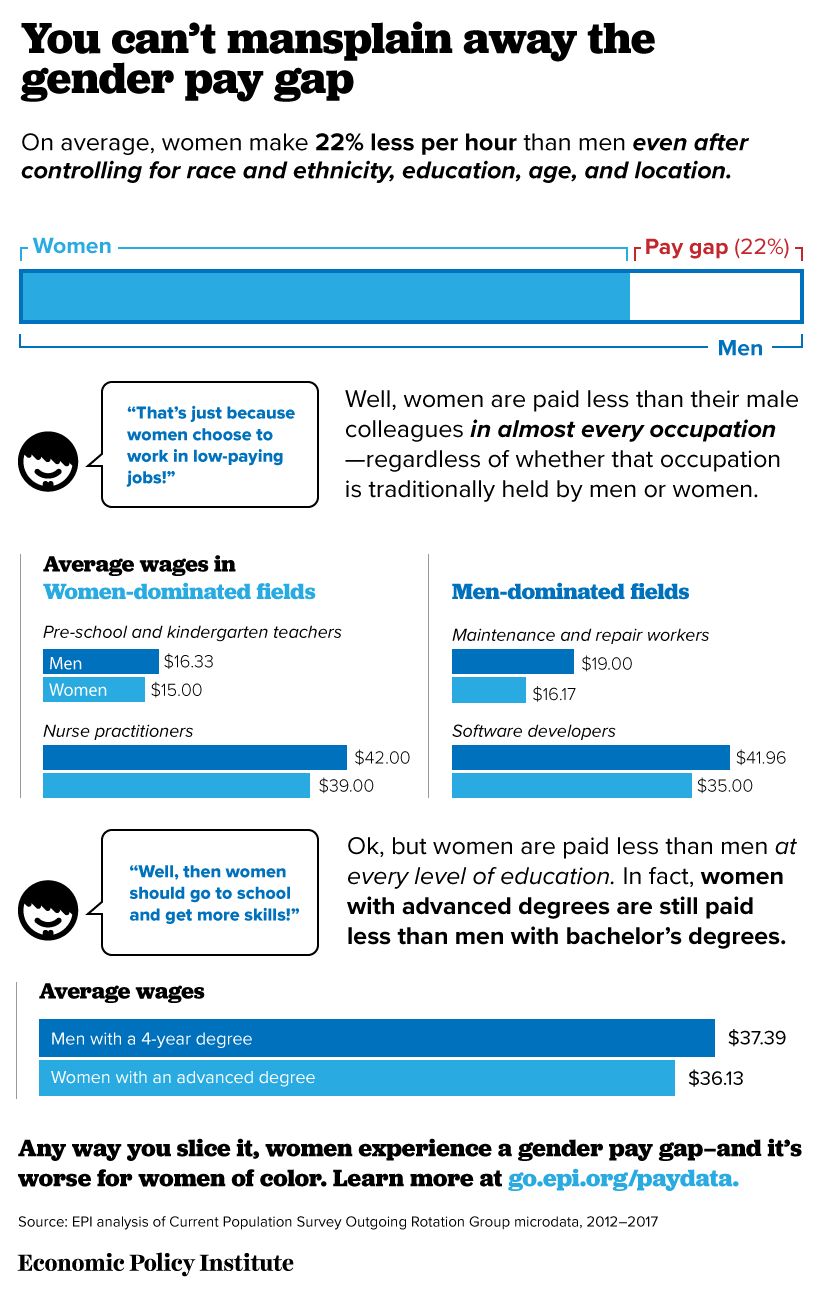
Equal Pay Day is recognized on different days depending on the year and the country because it symbolizes how far into the year women must work to earn what men earned in the previous year.
Another way of looking at it is that if men and women both started working January 1, 2017, then men got to stop working December 31 and the women have been working since then for free. That’s because women made 22% less on average in 2017 than men. The gap only gets wider when you also take race and ethnicity into consideration.
According to the Economic Policy Institute:
“While April 10th is the overall Equal Pay Day, the gaps for women of color are even larger. As compared to white men, women of color have to work even further into 2018 to make up for the wage deficit they experienced in 2017. Black women’s equal pay day is August 7th, Native American women’s equal pay day is September 27th, and Latina equal pay day doesn’t come until November 1st, almost an entire second year of working to equal typical white male wages in 2017.”
The good news is that even though all the factors that contribute to women earning less than men are complicated, simply belonging to union and having the support that comes from being part of a union family goes a long way in evening out the wage gap. Unions raise wages in women-dominated service occupations (which include food service and janitorial services). Union women working in those industries make 87% more in total compensation and 56% more in wages than their nonunion counterparts. And overall, hourly wages for union women are 9% higher on average than for nonunionized women.
Peace of Mind
“There are probably Federal Laws that protect non-union workers but having such language in your contract makes it easier. I know my union will fight for me,” says Jennifer Rios. “Under a union contract, depending on your job classification, we’re all paid the same. We all move through the same progression steps. With the guaranteed wage increases, I’m able to do a little extra for my family, such as planning a family outing bowling.”
“The guaranteed wage increase helped me and my family a lot,” echoes Local 338 member Evony, who works at Duane Reade in New York. “It’s helped me pay my bills and doing more for my kids. Unlike non-union workers, we know we’re getting our set raise.”
Crystal Quarles worked at a teacher for nearly 15 years and made $8/ an hour with no health insurance. When she started at Kroger in 2014, she joined the UFCW Local 700 without hesitation. Because of her 6 month wage increases she is now at her top rate of pay. As a single mom, she is very glad to have a contract where women are paid the same amount as men for the same work.
Equal Opportunity
Being paid different amounts for the same level of work isn’t the only thing that keeps women stuck earning less. Sometimes, it’s lack of access to higher paid positions. There again unions help ensure equal access to opportunities for advancement for all workers.
In March of 2014 Marlenny Solaris, a UFCW Local 342 member, heard there may be a job opening she could bid on at the nursing home where she worked. This Porter job was typically performed by men in the Porter classification, and she was told by the Supervisor that it was not a woman’s job. When the Home did not put the posting up, Solaris bid on another job and got it. Only after she received her new position did her supervisor post the full-time Porter classification job Solaris had originally expressed interest in.
Local 342 Representatives backed Solaris when she again applied for the now posted Porter position and then she got it. This paved the way for more women who have since taken jobs at the nursing home as Porters. Her situation also shows how the ways in which women can be prevented from having access to higher-paid positions can be complicated, because without a union there to represent her, there’s little chance Solaris would have been able to even apply for the position she was qualified for and had expressed an interest in.
Training
Union membership also helps provide training to help level the playing field for hardworking men and women, regardless of gender.
“I didn’t have to take out a student loan to become a pharmacy Technician,” says Margarita Alejandro, a UFCW Local 1428 member who works at CVS in California. “Thanks to my union contract I’m able to get on the job training from my clerk position to technician and to make more money and provide for my family.”

